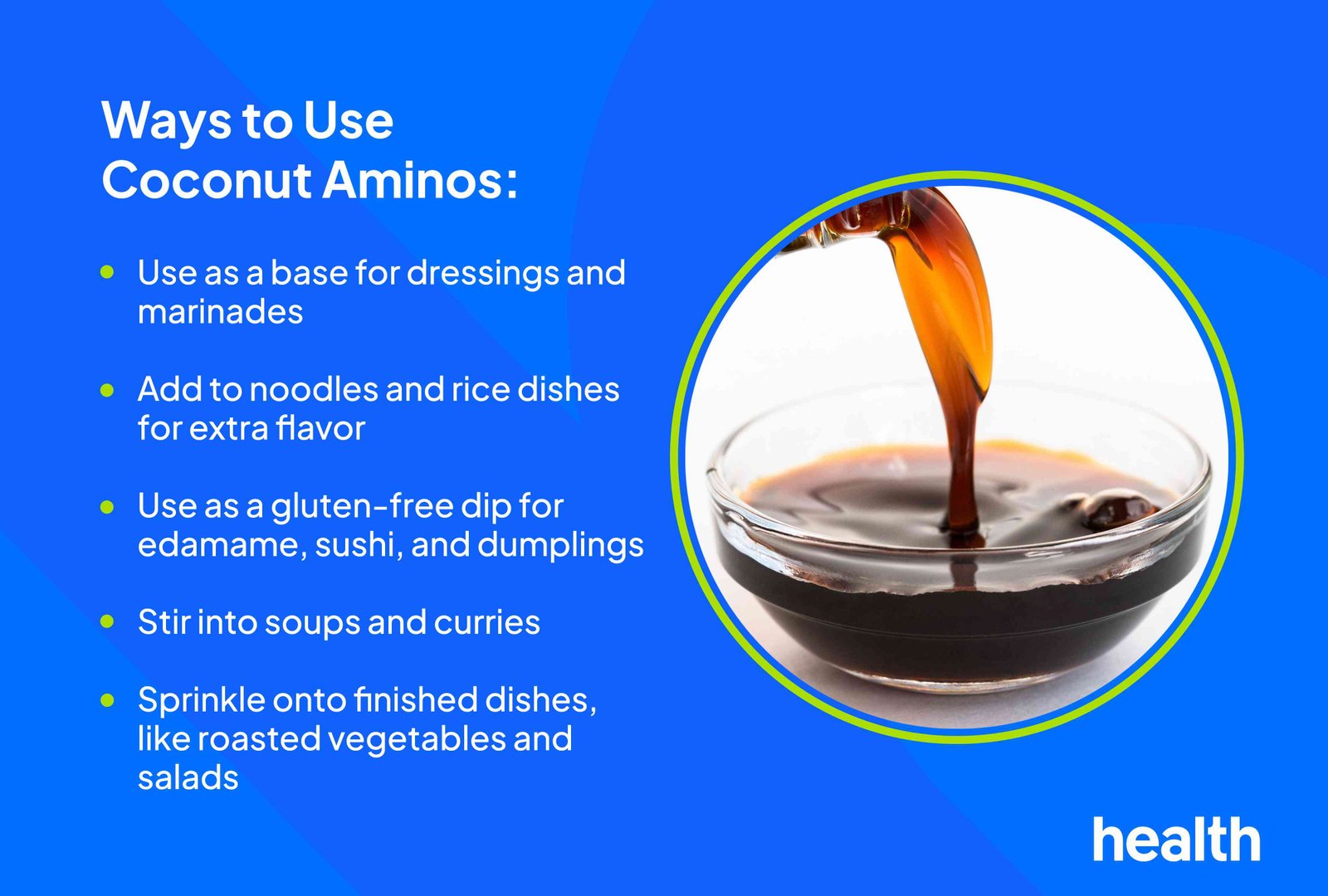Coconut aminos is a salty sauce made from fermented coconut juice or nectar. (Cocos nucifera).
Coconut aminos are a popular product among people with food allergies and those with celiac disease because the sauce is free of soy, wheat, gluten, and other major allergens. It is commonly used as a gluten-free alternative to soy sauce and can be used to add flavor to dishes such as noodles, stir-fries, and soups.
Coconut aminos are a good option for people with certain food allergies or who want to reduce their sodium intake, but this coconut-based product doesn’t offer much in terms of nutritional value or significant health benefits. .
Design by Health/Getty Images
Sodium is an essential mineral required for important processes in the body such as fluid regulation and nerve function. However, while we need some sodium in our diet, most Americans exceed the recommended daily amount of sodium, which can be harmful to our health. Your current sodium intake (DV) is less than 2,300 milligrams (mg) per day, which is about 1 teaspoon of table salt. Research shows that the average American consumes about 3,400 mg of sodium per day.
Eating a high-sodium diet can increase your risk of developing health conditions such as high blood pressure and kidney disease. People with certain medical conditions, such as kidney disease or congestive heart failure, may need to limit their sodium intake to manage symptoms associated with their medical conditions and prevent disease progression.
Coconut aminos have a salty taste, but are much lower in sodium than table salt or soy sauce. One teaspoon of coconut aminos contains 140mg of sodium, which is 6% of the DV. Most soy sauces contain at least 300 mg of sodium per teaspoon, while 1 teaspoon of table salt contains about 2,300 mg of sodium.
Although coconut aminos are not considered a low-sodium product, they contain more than 50% less sodium than soy sauce and much less than table salt. Replacing salt, soy sauce, and other high-sodium ingredients with coconut aminos can significantly reduce your sodium intake and your risk of developing certain health conditions, such as high blood pressure.
Coconut Aminos are made from coconut sap and are free of major allergens such as soy, gluten, wheat, dairy, and tree nuts.
Soy sauce is made by fermenting a mixture of wheat and soybeans. Soy sauce is made with soy and wheat, so it is not safe for people with allergies or intolerances to soy, wheat, or gluten.
Coconut aminos are commonly used as a soy sauce substitute by people with certain food allergies and medical conditions such as celiac disease and other gluten-related diseases.
These people can use coconut aminos as an allergy-safe substitute for soy sauce or add it as a flavoring to gluten- and soy-free dishes. However, people who are allergic to coconut should not consume coconut aminos.
Coconut aminos have several culinary uses and are an allergy-safe alternative to soy sauce, but they don’t offer much in terms of nutritional value.
Coconut aminos are low in calories and do not contain many vitamins and minerals.
One teaspoon of coconut aminos contains:
- calorie: Ten
- fat: 0 grams (g)
- carbohydrates: 2g
- protein: 0g
- sodium: 140mg
Most coconut amino products are made with coconut flower nectar, salt, and water. However, some products also contain other ingredients, such as apple cider vinegar, to add flavor.
Some coconut amino products contain trace minerals such as calcium and potassium, but regular portions do not contain large amounts of vitamins and minerals.
Coconut aminos are generally safe to consume. However, because it is made from coconut sap, coconut aminos are not safe for people who are allergic to coconut or coconut-based products.
Coconut aminos also have much less sodium than soy sauce or table salt, but it’s still a high-sodium product. Use coconut aminos sparingly to keep your sodium intake below the recommended daily intake.
Although coconut aminos are often promoted as a health food, they contain few vitamins, minerals, and other beneficial compounds. Additionally, there are currently no studies conducted on the health effects of coconut aminos, so it is unclear how consuming coconut aminos regularly will affect your health.
For these reasons, coconut aminos, like any salty condiment, should be used sparingly.
Coconut aminos have a salty, slightly sweet taste that pairs well with savory foods such as vegetables, fish, and poultry.
Coconut aminos can be used in the same way as soy sauce and can be added to savory dishes to enhance flavor.
Here’s how to incorporate coconut aminos into your diet.
- Can also be used as a base for dressings and marinades
- Adding it to noodles and rice dishes enhances the flavor.
- Use as a gluten-free dip for edamame, sushi, and gyoza.
- Mix it into soup or curry.
- Sprinkle over finished dishes such as roasted vegetables or salads.
Coconut aminos can be used as a one-to-one replacement for soy sauce when cooking, but be aware that the taste will be slightly different. It has much less sodium than soy sauce and is a bit sweeter, so you may need to add additional ingredients to your recipe to achieve your desired taste.
Coconut aminos are products typically made from fermented coconut sap, water, and salt. The taste is similar to soy sauce, but it is much less salty. Additionally, coconut aminos are free of major allergens such as gluten, wheat, and soy, making this sauce a popular product among people with food allergies.
Coconut aminos have a salty, slightly sweet taste and can be used as a base for marinades, dipping sauces, and dressings, or added to recipes such as stir-fries, soups, and noodle dishes.
Coconut aminos have a good flavor and are lower in sodium than table salt or soy sauce, but they are not a significant source of nutrients and are relatively high in sodium. Therefore, it is best to consume it in small quantities.

